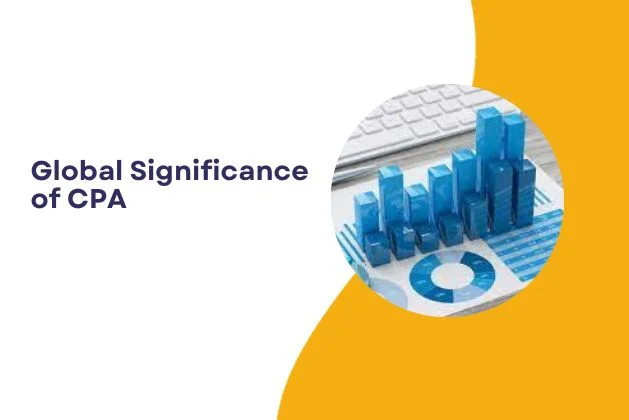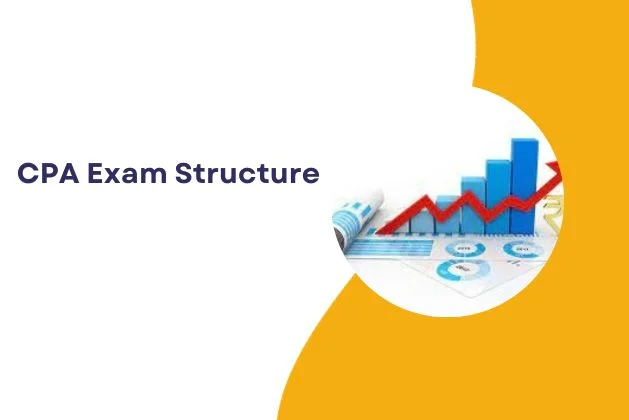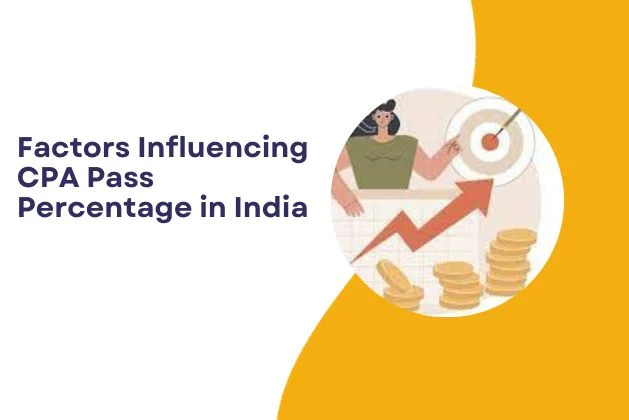Table of Contents
ToggleIntroduction
The Certified Public Accountant (CPA) designation is a highly esteemed and internationally recognized credential that serves as evidence of an individual’s extensive knowledge and proficiency in the fields of accounting and finance.
In recent years, there has been a remarkable increase in the number of Indian accounting professionals who have shown interest in obtaining CPA certification, indicating a growing recognition and appreciation for the value and credibility of this qualification.
In this blog, we will delve deeper into the CPA pass percentage specifically in India, exploring the various factors that contribute to success rates and shedding light on the unique journey of aspiring CPAs within the country.
This analysis aims to provide a comprehensive understanding of the challenges and opportunities faced by those pursuing this prestigious designation in India.
From academic requirements to cultural influences, we will examine how these factors impact CPA pass rates and shape the experiences of individuals striving towards this professional achievement.
Furthermore, through an exploration of past trends and current statistics, we will gain insight into the overall performance of Indian candidates on the CPA exam.
Global Significance of CPA

The CPA credential, which is granted by the highly respected American Institute of Certified Public Accountants (AICPA), holds a significant level of esteem and recognition on a global scale.
It serves as a testament to an individual’s comprehensive comprehension of fundamental accounting principles, intricate financial regulations, and unwavering commitment to ethical standards.
This prestigious certification serves as a symbol of excellence in the field of accounting, showcasing an individual’s extensive knowledge and expertise in various areas such as auditing, taxation, financial reporting, and management accounting.
In addition to demonstrating a thorough understanding of these core concepts, the CPA designation also highlights an individual’s ability to apply critical thinking skills and sound judgment in complex financial situations.
Moreover, the AICPA is widely recognized as one of the most prominent professional organizations for CPAs, known for its rigorous standards and stringent requirements for obtaining the CPA credential.
This includes completing a rigorous educational program with coursework in accounting, business law, economics, finance, and taxation.
CPA Exam Structure

The Certified Public Accountant (CPA) exam is a comprehensive assessment that consists of four distinct sections: Auditing and Attestation (AUD), Business Environment and Concepts (BEC), Financial Accounting and Reporting (FAR), and Regulation (REG).
These four sections encompass a wide range of accounting concepts, principles, and practices, making it a rigorous test that demands thorough preparation.
The first section of the CPA exam, Auditing and Attestation (AUD), focuses on evaluating an organization’s financial statements and internal controls.
This section assesses a candidate’s understanding of the auditing process, including procedures for obtaining evidence and issuing audit reports.
Next is the Business Environment and Concepts (BEC) section, which tests a candidate’s knowledge of various business aspects such as economics, finance, operations management, and information technology.
It also includes topics related to business ethics and corporate governance.
Factors Influencing CPA Pass Percentage in India

a. Exam Preparation:
The CPA exam demands extensive preparation. Candidates often enroll in CPA review courses, self-study programs, or join coaching classes to cover the vast syllabus comprehensively.
b. Study Material:
The quality of study material is crucial. Candidates often use textbooks, online resources, and practice exams to hone their skills and familiarize themselves with the exam format.
c. Work Experience:
While work experience is not a prerequisite to sit for the CPA exam, practical exposure in the field of accounting and finance can significantly contribute to a candidate’s understanding and application of concepts.
d. Exam Strategy:
Creating a strategic approach to tackle each section is essential. Candidates may choose to focus on their strengths first or prioritize sections with higher weights in the overall scoring.
CPA Pass Percentage Trends in India

Over the course of several years, the pass percentage for the Certified Public Accountant (CPA) exam in India has undergone notable fluctuations.
These changes in success rates can be attributed to a variety of factors, including alterations to the exam format, updates to the syllabus content, and variances in candidate preparation methods.
One significant factor that can impact the pass percentage is the adjustments made to the format of the CPA exam.
As with any standardized test, slight modifications to the structure and scoring system can greatly affect how well candidates perform.
These changes may include adjustments to the number or types of questions, time limits, or weighting of certain sections.
In addition, updates to the syllabus material can also play a crucial role in determining pass rates.
As accounting practices and regulations evolve over time, it is necessary for the CPA exam to reflect these changes.
This means that candidates must constantly adapt and keep up with new information in order to succeed on the exam.
Also Read: What is the Work of CS
Challenges Faced by Indian CPA Aspirants
a. Diverse Accounting Standards
Indian accountants may encounter various obstacles and hurdles when attempting to adjust to the Generally Accepted Accounting Principles (GAAP) utilized in the United States.
This set of accounting standards, which has been adopted by the Financial Accounting Standards Board (FASB), differs significantly from the International Financial Reporting Standards (IFRS) that are commonly followed in India.
These differences can present a significant challenge for Indian accountants as they navigate through the complex regulations and guidelines of GAAP.
One of the main challenges faced by Indian accountants is understanding the fundamental principles and concepts that underlie GAAP.
Unlike IFRS, which is based on a principles-based approach, GAAP follows a rules-based approach.
This means that Indian accountants must learn and apply specific rules for each accounting transaction, rather than relying on broad principles.
b. Time Management
Finding a balance between fulfilling work responsibilities and adequately preparing for the challenging CPA exam can be an overwhelming task.
The pressure to perform well in both areas can be immense, and it is essential to manage one’s time effectively to achieve success.
Juggling a full-time job and studying for such a rigorous exam requires a considerable amount of dedication and discipline.
One must not only prioritize their tasks but also allocate their time wisely to ensure they are giving adequate attention to both their work commitments and exam preparations.
Moreover, effective time management goes beyond just setting schedules and deadlines.
It involves understanding one’s strengths and weaknesses, knowing when to take breaks, and utilizing available resources efficiently.
It also requires being adaptable and adjusting plans as needed to accommodate unexpected challenges or opportunities.
The CPA exam is known for its complex and comprehensive content, making it crucial to devote sufficient time for studying.
However, as working professionals, we often have limited free time outside of our job responsibilities.
c. Cultural Differences
Communication and understanding can be greatly influenced by cultural nuances, which are subtle and often overlooked differences in customs, values, and behaviors.
These nuances can have a significant impact on how individuals interpret and apply certain concepts, particularly in the field of accounting.
As such, candidates preparing for a global accounting exam may face the challenge of bridging the gap between their local accounting practices and the standardized global standards that will be tested.
One key factor contributing to these cultural nuances is the diverse backgrounds and experiences of individuals.
Different regions and countries have their own unique cultural norms when it comes to business practices, financial reporting, and ethical considerations.
For example, while certain countries may place a strong emphasis on personal relationships in business dealings, others may prioritize efficiency and direct communication.
These variations can greatly affect how information is conveyed and understood.
Moreover, language barriers can also play a significant role in communication challenges.
Success Stories and Strategies
Despite the many obstacles and difficulties that they may have faced, there are countless Indian professionals who have achieved the prestigious CPA designation through their hard work and dedication.
These individuals have overcome various challenges and emerged victorious, serving as a source of inspiration and guidance for others who aspire to become CPAs.
One of the most effective ways to motivate and guide aspiring CPAs is by sharing the success stories of those who have already conquered the rigorous CPA exam.
These success stories not only highlight the achievements of these individuals but also provide valuable insights into the strategies they employed to pass the exam.
Through these success stories, aspiring CPAs can gain a better understanding of the journey towards earning their CPA designation.
They can learn about the sacrifices, dedication, and perseverance required to overcome any challenges that may arise during their preparation for the exam.
Furthermore, these success stories can also shed light on the unique experiences and perspectives of Indian professionals in their pursuit of becoming CPAs.
Conclusion
The path towards achieving the coveted CPA designation in India is a rigorous and fulfilling experience, marked by various challenges and triumphs.
With the evolving CPA pass percentage in the country, aspiring candidates are constantly motivated to utilize high-quality study resources, employ effective exam strategies, and draw inspiration from the success stories of those who have achieved this esteemed title.
Beyond just gaining a prestigious designation, becoming a CPA also opens doors to exciting international opportunities and solidifies one’s reputation as a competent and ethically-driven accounting professional on a global platform.
Frequently Asked Questions (FAQs)
The CPA pass percentage in India can vary from year to year. It is influenced by factors such as the difficulty of the exam, changes in syllabus, and the preparedness of candidates.
The CPA exam consists of four sections: Auditing and Attestation (AUD), Business Environment and Concepts (BEC), Financial Accounting and Reporting (FAR), and Regulation (REG). Each section assesses different aspects of accounting and finance, and candidates must pass all sections to obtain the CPA designation.
Several factors contribute to CPA pass percentages, including the level of exam preparation, the quality of study materials, candidates’ work experience, and their strategic approach to the exam. Changes in exam format and syllabus updates can also impact pass rates.
Yes, Indian CPA aspirants may face challenges related to adapting to the Generally Accepted Accounting Principles (GAAP) used in the United States, managing time effectively due to work commitments, and bridging cultural differences that may impact understanding certain concepts tested in the exam.
While work experience is not a prerequisite for taking the CPA exam, candidates often find that practical exposure in the field of accounting and finance enhances their understanding and application of the concepts tested in the exam.
Candidates in India can prepare for the CPA exam by enrolling in CPA review courses, utilizing quality study materials, participating in coaching classes if needed, and creating a strategic approach to tackle each section. Effective time management is also crucial.
Yes, there are success stories of Indian professionals who have successfully earned the CPA designation. Learning from the experiences and strategies employed by those who have passed the exam can provide valuable insights and motivation for aspiring CPAs.
The CPA designation is globally recognized and opens doors to international opportunities for Indian professionals. It establishes them as proficient and ethical accounting professionals, enhancing their career prospects on a global scale.



